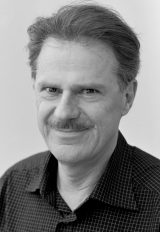Andreas Müller-Pohle
Andreas Müller-Pohle, born in Braunschweig in 1951, is a Berlin-based media artist and publisher. He studied economics and communication sciences at the Universities of Hannover and Göttingen. In 1979, he founded European Photography, an independent art magazine for contemporary photography and new media. His first artistic projects in the late 1970s focused on issues of photographic perception, and later on photo recycling, now also incorporating video. In the mid-1990s, he began exploring the use of digital, genetic, and political codes. This was followed by various projects on the topic of water, including extensive portraits of the Danube River and the megalopolis of Hong Kong.
Müller-Pohle’s work has been widely published and exhibited, and is included in numerous private and museum collections worldwide. As a publisher, he has edited the major works of media philosopher Vilém Flusser, available today in the ten-volume Edition Flusser, including the groundbreaking Philosophy of Photography, which has been translated into over twenty languages. With the publication of Flusser’s essay Die Schrift: Hat Schreiben Zukunft? (Does Writing Have a Future?) on floppy disk in 1986, Müller-Pohle is considered one of the pioneers of today’s e-book. In 2001, he was awarded the European Photography Prize by the Reind M. De Vries Foundation. He is the author of numerous texts on photographic theory, including “Visualism,” and has been a visiting professor and lecturer at institutions such as the Higher Institute of Fine Arts in Antwerp, Belgium, and the Hong Kong Design Institute.
Following his long-term projects Studies on Water and Studies on Traffic – which combine photography, video, and sound to explore global waterscapes and mobility phenomena across regions – since 2023 he has focused on the challenges and conditions of artificial intelligence. His essay Artificially Intelligent Image World and his manifesto Machine Images – Twelve Theses offer a framing of the relationship between AI and contemporary visual culture. Recent AI projects include Niépce Recoded (2024), a conceptual work about the multiple translations of the world’s first photograph, and Robots (2026), a speculative compendium of robot designs.
In 2023 Müller-Pohle agreed to transfer his archive to the ZKM | Center for Art and Media, Karlsruhe, which also acquired a substantial part of his work for its collection.
